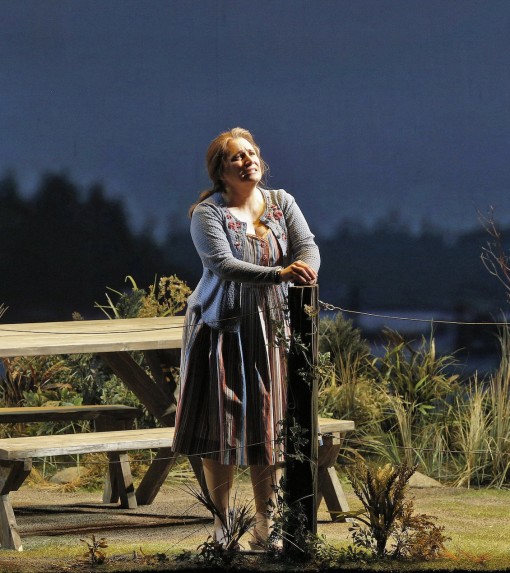Picker’s “Dolores Claiborne” a triumph for American verismo and San Francisco Opera

Patricia Racette stars in the title role of Tobias Picker’s “Dolores Claiborne,” which had its world premiere Wednesday night at San Francisco Opera. Photo: Cory Weaver
Tobias Picker’s gripping new opera, Dolores Claiborne, opened Wednesday night at San Francisco Opera in a world-premiere performance that proved a triumph for the composer, librettist, singers, and, indeed, the entire company.
Picker and librettist J.D. McClatchy have created a splendid adaptation of Stephen King’s suspense novel, taking a book that is a virtual monologue for the title character and turning it into an absorbing, tautly paced ensemble piece. Best of all, Picker has composed a memorably effective and often very beautiful score. Dolores Claiborne and the performers received an enthusiastic reception from the audience, with cheers and a well-deserved standing ovation for soprano Patricia Racette in the title role.
Dolores Claiborne tells the tale of a worn-down working-class woman, married much too young, and for all the wrong reasons, to Joe St. George, a drunk who beats her and begins to molest their teenage daughter Selena. Although it’s been billed as an “American Tosca,” these twisted family relationships make Dolores Claiborne closer in spirit to the brutal domestic dramas of Janáček.
Picker and McClatchy have structured the opera traditionally and to brilliant effect, with a series of striking arias, duets, and ensembles that unfold with nearly flawless momentum and continuity. After a tightly structured and headlong first act, there is some slackness in Act 2, with the dramatic and musical climaxes coming a bit too early in the final encounter between Dolores and Joe.
The composer’s vocal writing can be lyrical or angular, with the vocal parts floating over a roiling, churning orchestra that sounds far bigger than it actually is. Stylistically, the opera is cast in a kind of extended tonality, featuring a dissonant, melodic beauty that’s well-suited to the operatic stage.
The musical highlights of the opera, well worth performing as excerpts, include Dolores’s nostalgic aria, a trio in which Dolores and the aged Vera carry on in Maine while Selena sings bitterly about her adult life and lonely birthday, Joe’s molestation music, the ensemble in which Vera’s maids recount how hard it is to work for her, and the tremendous quartet that ends Act I.
Racette saved the day by stepping into this difficult part only weeks ago, following the surprise withdrawal of mezzo-soprano Dolora Zajick, the intended lead. Reports from the opera house, including Racette’s own published remarks, suggest that not many changes were made to the character’s part to adapt it for a soprano. Indeed, while the music occasionally dips a bit low for her, the writing otherwise fits Racette like a glove.
And so does the character itself. Racette is known as much for the intensity of her dramatic involvement as for the considerable beauty of her voice, and she turns in a brilliant performance as Dolores. Whether stubbornly coping with her aged and feeble employer, Vera Donovan, finally standing up to her abusive husband, or tenderly asking after Selena’s evident misery, Racette makes the character’s strength, vulnerability, and profane anger real and believable. She sounds terrific as well, whether in a long-breathed, wistful aria remembering a happier time in her life or singing the jagged music of her rage at Joe or Vera.
In fact, the entire cast is superb, and beautifully directed by James Robinson. Elizabeth Futral movingly portrays Vera Donovan’s physical and mental decline from a demanding, arch, sometimes-drunken young socialite to a broken-down, intermittently lucid old woman. Susannah Biller’s Selena St. George grows from vulnerable teenager to embittered alcoholic adult. She’s impressively convincing at every age, withdrawn and uncertain in her youth, confident and brassy as a middle-aged lawyer. Moreover, she sounds shockingly like a lighter voiced Racette, reinforcing their familial relationship and greatly intensifying their duets. Futral and Biller both handle the sometimes-stratospheric vocal writing with aplomb.
Wayne Tigges, in his first leading role for SFO, is an ideal Joe St. George, his rugged baritone and raw physicality making Joe menacing or pathetic by turns. He is both creepily seductive and terrifying in a scene in which Joe molests Selena in the foreground while Vera and Dolores sing in the background about just what is to be done with problem husbands. Tenor Greg Fedderly is a fine Detective Thibodeau, aggressively interviewing Dolores when she’s under suspicion of murder. The smaller roles are ably sung by Nikki Einfeld, Joel Sorensen, Robert Watson, and Adler Fellows Jacqueline Piccolino, Marina Harris, Laura Krumm, Renée Rapier, Hadleigh Adams, and A.J. Glueckert.
Christopher Akerlind’s gorgeous and atmospheric lighting design bring the Little Tall Island to life, most strikingly during the solar eclipse that takes place during Act II. Allen Moyer’s beautiful and colorful two-level sets contrast Vera’s wealth with both the bleak interrogation room and the mean little St. George house, and enable complex scenes set in two different locations simultaneously. Greg Emetaz’s projections provide beautiful backgrounds and seamless scene transitions. George Manahan, in his San Francisco Opera debut, conducts the complex score with flair and great sympathy for the singers.
Dolores Claiborne will be repeated September 22, 25, and 28 with Patricia Racette in the title role, and on October 1 and 4 with Catherine Cook as Dolores. San Francisco Opera; 415-864-3330.
Posted Sep 20, 2013 at 5:46 pm by jds
Your review nailed it, where the true strengths of the opera are, how the opera was constructed and staged, you caught the most important elements – which means the opera succeeded as a work of art. Very observant and excellently summarized.
One note: the role was originally written with Racette in mind – she having been the heroine in another Picker opera.